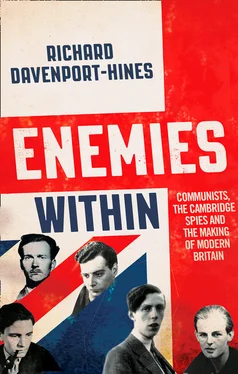The watch on Rose Edwardes had meanwhile revealed that she was running a new front for Ewer’s group, the Featherstone Typewriting Bureau in Holborn, which had been started soon after Ewer’s closure of the FPA. Ewer, Holmes, Dale and Edwardes often conferred in Holborn; Dale, under cover of a Shoreditch Borough Council investigator, acted as Ewer’s intermediary with the Special Branch informants. When Allen had ended his account, Harker revealed that the other FPA personnel had continued working together at the typewriting bureau. ‘In all my previous dealings with him, he has always been calm and collected and rather humorous … but on receipt of the information that the show had practically been going on minus himself, his self-control broke down,’ Harker reported. ‘He stamped round the room, swore and expressed the opinion that he, ALLEN, had been double-crossed, even going so far as to say he would give evidence against the — — — who had let him down in this scandalous manner.’ Harker doubted if there was much risk of this. ‘ALLEN is not a fool and he realises that, were he to come into the open with his full story, it would be quite impossible for him to lead subsequently a quiet life in this country, and in order to induce him to come into the open, it would be necessary … to arrange for him to retire to some other country where he could start life again under a new name.’ When Harker paid the £50, Allen ‘went out of his way to express his gratitude to [sic] my generosity in coming down and giving him the chance of telling a story which I had found out already for myself’. 36
After his arrest Ginhoven contacted Hayes, who defended him in an article in the Police Review and used him as an intermediary to contact Ewer. Harker became convinced that Moscow had ‘some hold’ over Hayes – perhaps evidence that Hayes had always understood the nature of his men’s work for Ewer although, in Harker’s words, ‘as he began to get on more in the world, HAYES ceased to interest himself in the [undercover] organisation, and latterly apparently had little if anything to do with it’. 37
Hayes had made a success of politics in the previous six years. It will be recalled that NUPPO’s strike of 1919 had taken hold only in Merseyside. Hayes, who had worked in youth at a corrugated-iron business at Ellesmere Port, stood unsuccessfully in the Liverpool municipal elections of 1919 as a NUPPO-sponsored Labour candidate and again unsuccessfully for the Liverpool parliamentary constituency of Edge Hill at the next general election. In 1923, when a by-election was called in Edge Hill, he was elected as Liverpool’s first Labour MP. Arriving in London by train to take his seat in the House of Commons, he was hoisted shoulder high and carried across the station concourse by 200 cheering NUPPO members blowing bugles. 38
In parliament Hayes was counted as a moderate socialist. Appointed as an opposition whip in the Commons in 1925 and elected to the party’s national executive in 1926, he became a reliable, sapless party hack. As the government’s third most senior whip after Labour’s victory at the general election of 1929, his duties included the compilation of a daily summary for King George V of Commons debates. The Tory MP Sir Henry Betterton, afterwards Lord Rushcliffe, had a story of seeing two Labour whips on a visit to Palestine. ‘Jack Hayes (the Liverpool policeman), now Treasurer of the Household, was very drunk and staggering about on the platform. As a train drew in, his pal urged him to pull himself together and said, “the Treasurer of Palestine is on this train.” Hayes clicked his heels and stood at attention with his hand at the salute and said “Treasurer be b—d. I am His Majesty’s Treasurer”, and added fervently, “Gawd bless ’im”.’ 39
The general election of May 1929 was approached with heavy apprehension by many Conservatives because it was the first contest with the enlarged franchise of the so-called Flapper Vote. ‘Votes for women at 21 is alarming people up here and there is no doubt that we are taking a big leap in the dark,’ judged Cuthbert Headlam, a Tory whose constituency lay in a northern mining county. He expected ‘a big increase in the Socialist vote. In our pit villages the women are far wilder than the men – they are hopeless to argue with – they listen to the sob stuff with open ears.’ 40
The involvement of a popular Labour whip in a spying scandal during election year would have aroused suspicions that the arrests were a pre-election stunt by intelligence mavericks similar to those behind the Pravda and Zinoviev forgeries. The government was to prove chary in 1934 when the CPGB member Edgar Lansbury, late of the Anglo-Russian Three Ply and Veneer Company, was prosecuted under the Official Secrets Act: as the Solicitor General, Somervell, noted, ‘The Cabinet are very apt to be afraid that a quasi-political prosecution will lead to a row.’ Similar squeamishness was one reason for the decision not to prosecute Ginhoven and Jane who, after hearings by a disciplinary board, were dismissed from the police on 2 May (the general election was to be held on 30 May). Another good reason for disciplinary proceedings rather than a criminal trial was to avoid discomfiting public revelations in court. It would have harmed future MI5 investigations if the extent to which Allen had been turned by MI5 and had informed on his former employers, both English and Russian, had been publicized. MI5’s improving tradecraft was saved from public exposure. The agency was enabled to continue watching and learning from its adversaries. 41
Ginhoven and Jane expected demotion to the ranks of sergeant and constable, and were indignant at their dismissal from Special Branch. Harker was disquieted to find that ‘both inside the Special Branch and outside, there is a good deal of sympathy with the two men, who – by the majority ignorant of all … the true facts – are considered to have been punished with unjustifiable severity’. This reaction resulted from ‘the Scotland Yard policy of concealing all the true facts as far as possible. One begins to wonder how far the very clumsy investigation may not have been inspired by a desire to produce such a state of mind with the Disciplinary Board itself!’ Another puzzle is the fate of Sidney Russell Cooke. In July 1930 he was found in the dining-room of his chambers in the Temple dead of an oddly angled gunshot wound to the abdomen. It was unlikely that the wound was accidental; hard to believe that ‘Cookie’ had killed himself; but the possibility that he died as the result of his association with Harker has never been aired. 42
Labour’s electoral victory encouraged Ewer, who in the weeks afterwards seemed to the incoming junior FO minister Hugh Dalton to be ‘a tiresome busybody’, lobbying for the restoration of diplomatic relations with Moscow, which had been severed after the ARCOS raid. Disillusion with Marxist orthodoxy came soon. In August Ewer took a reflective holiday in Warsaw and the Carpathian resort of Zakopane. After returning in September, he wrote an article for the communist Labour Monthly in which he argued that Anglo-Russian tensions were not simply an ideological clash of capitalism and communism, but also derived from their nineteenth-century rivalry as Asiatic powers. The piece was denounced as counter-revolutionary and Ewer was expelled from party membership. In a letter to Rajani Palme Dutt, the Stalinist doctrinaire in the CPGB, possibly written in the knowledge that his words would be intercepted and read by MI5, Ewer declared his apostasy. Communists ‘have come to talk only in an idiom, which, once a powerful instrument of thought, has become so worn and so debased that – like the analogous idiom of the Christian Churches – it no longer serves for thinking, but only as a substitute for thinking’. In all disputes ‘they rely upon the repetition of phrases which have come to be as mechanical – and yet, to them, as magically authoritative – as the formulae of the Athanasian creed’. He rejected the authoritarianism which enforces doctrinal conformity, ‘condemns all “deviation” as a moral offence’ and imposes obedience by the ‘apparatus … of confession, of absolution, of excommunication’. 43
Читать дальше












